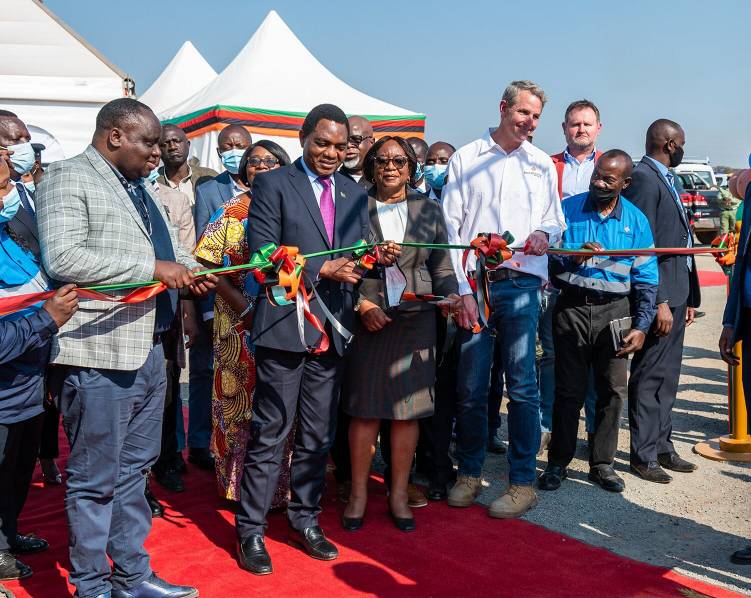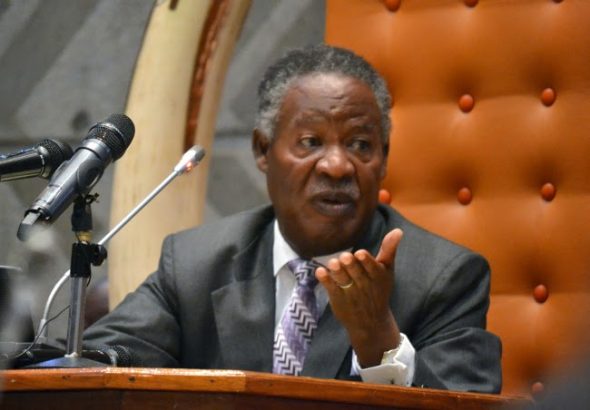
President Hichilema cuts the ribbon at the ground-breaking ceremony of the Enterprise Nickel Project, an open-pit mine owned and operated by Kalumbila Minerals, a wholly-owned subsidiary of FQM.
But as Indonesia bans exports of nickel ore, a key battery material, Zambia has handed Africa’s largest Nickel mine in North Western Province to FQM to create over 700 jobs in a country of 18m.
Lusaka, April 23 – Chile’s President Gabriel Boric said on Thursday he would nationalize the country’s lithium industry, the world’s second largest producer of the metal essential in electric vehicle batteries, to boost its economy and protect its environment.
The shock move in the country with the world’s largest lithium reserves would in time transfer control of Chile’s vast lithium operations from industry giants SQM and Albemarle to a separate state-owned company.
It poses a fresh challenge to electric vehicle (EV) manufacturers scrambling to secure battery materials, as more countries look to protect their natural resources. Mexico nationalized its lithium deposits last year, and Indonesia banned exports of nickel ore, a key battery material, in 2020.
“This is the best chance we have at transitioning to a sustainable and developed economy. We can’t afford to waste it,” Boric said in an address televised nationwide.
But President Hakainde Hichilema of Zambia is on a different trajectory, having handed Africa’s largest Nickel mine in Kalumbila District in North Western Province to First Quantum Minerals Limited (FQM).
Also Read: Botswana threatens break-up with De Beers.
During the launch of the $250m Enterprise Nickel Mine, President Hichilema exposed his lack of foresight when he eulogised the possible creation of over 700 new jobs in a country of 18m people as the pinnacle of the mining project at the expense of what the country can make out of the metal as the world shifts from fossil fuels.
Speaking at the ground breaking ceremony in Kalumbila, the President said in addition to the over 700 jobs that would be created, the Nickel Mine would uplift the living standards of the people of North-Western Province and the country at large, emphasizing that the investment by FQM was a sign that there was investor confidence in the mining sector owing to the various mining policies that had been implemented. He is clearly comfortable with Zambia remaining a good Samaritan as multinational mining firms exploit the country’s mineral resources.
“We are fortunate as a country to have a fair share of minerals needed for transitioning from brown energy to green energy, such as nickel, copper, cobalt, manganese, and lithium. But if they stay in the ground, we do not arrange projects like this; we do not unlock projects like this; then we will not be able to play our part in keeping our world cleaner,” the President said.
◾CODELCO Role.
Boric said state-owned Codelco, the world’s largest copper producer, will be tasked to find the best way forward for a state-owned lithium company and he would seek approval from Congress for the plan in the second half of the year.
Congress has been a check on many of Boric’s more ambitious proposals and shelved a proposed tax reform bill in early March.
Codelco and state miner Enami will be given exploration and extraction contracts in areas where there are now private projects before the national lithium company is formed.
A division will be dedicated to advancing technology to minimize environmental impacts, including favoring direct lithium extraction over evaporation ponds.
Privately held Summit Nanotech Corp, which is developing direct lithium extraction technology, welcomed the announcement.
Boric said the country would look to protect biodiversity and share mining benefits with indigenous and surrounding communities.
“Today, we present a national lithium strategy that’s technically solid and ambitious,” the president said, adding it would build “a Chile that distributes wealth we all generate in a more just way”.
Woodpecker’s Digest is on Facebook. To follow our articles on Facebook, like our page by clicking HERE.
©2022 Woodpecker’s Digest Inc.
Putting news into perspective







